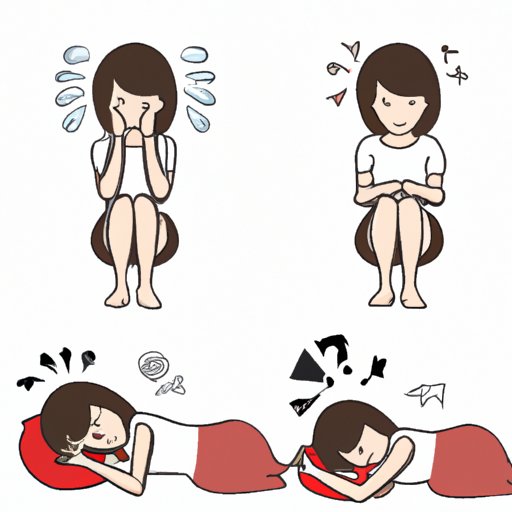
Introduction
Depression is a common mental health condition that affects millions of people across the globe. In fact, the World Health Organization reports that 264 million people around the world suffer from depression. Although it is a prevalent condition, depression is still often misunderstood and stigmatized, which is why it’s essential to know the signs and symptoms to help people receive the support they need.
The purpose of this article is to explain some of the most common signs and symptoms of depression, including the often-overlooked physical symptoms. We will also discuss how the condition affects different age groups, and why early recognition is important for recovery.
Common Signs and Symptoms of Depression
Depression can manifest in various ways. While some symptoms may be more obvious than others, it’s essential to know that people experience depression differently. However, some of the most common signs and symptoms include:
- Low mood and persistent sadness
- Loss of interest or pleasure in activities
- Changes in appetite and weight fluctuations
- Trouble sleeping or sleeping too much
- Fatigue and loss of energy
- Difficulty thinking, concentrating, or making decisions
- Feelings of worthlessness or excessive guilt
- Thoughts of death or suicide
These symptoms can affect daily life and functioning, leading to problems with work, school, and relationships. Many people with depression may feel isolated and unsupported, which may also exacerbate the condition.
Overlooked Physical Symptoms of Depression
While depression is primarily a mental health disorder, it can also affect physical health. Some physical symptoms of depression may include:
- Headaches or migraines
- Body aches and pains
- Digestive issues
- Increased sensitivity to pain
- Changes in appetite and digestion
- Chronic fatigue
These symptoms can impact daily life and may be mistaken for a physical illness. If you notice these symptoms and cannot explain why they are happening, it’s worth considering whether they may be related to depression. The reason behind these physical symptoms is due to inflammation, which has been linked to depression and a range of other medical conditions.
Emotional and Psychological Symptoms
Along with physical symptoms, depression can also manifest in emotional and psychological ways. These symptoms can include:
- Feelings of hopelessness and pessimism
- Increased irritability or restlessness
- Difficulty finding joy in activities you once enjoyed
- Difficulty concentrating or making decisions
- Changes in sleeping patterns, including insomnia or excessive sleeping
- Feeling anxious or “on edge”
- Decreased sex drive or performance
It’s essential to note that everyone experiences emotions differently. However, the emotional symptoms of depression may feel more severe than typical mood fluctuations. It’s crucial to pay attention to how long these symptoms last and how they impact your day-to-day life.
Early Warning Signs
Recognizing the early warning signs of depression can be lifesaving. Some early signs may include:
- Increase or decrease in appetite
- Changes in sleep patterns
- Loss of interest in social activities
- Physical symptoms such as headaches or body aches
- Feeling more fatigued than usual
- Decreased productivity or difficulty concentrating
- Feelings of sadness or hopelessness
Recognizing the early warning signs of depression can help identify the condition before it becomes more severe. If you or someone you know is experiencing any of these symptoms, seek professional help as soon as possible to prevent the condition from getting worse.
Signs of Depression in Different Age Groups
Depression can affect individuals of all ages. However, the symptoms may manifest differently in different age groups:
Children and Adolescents
Depression symptoms in children may include:
- Frequent sadness or tearfulness
- Changes in appetite or weight
- Sleep disturbances
- Refusal to attend school or do school work
- Physical complaints with no obvious medical cause
Depression symptoms in adolescents may include:
- Mood swings and irritability
- Social withdrawal or isolation
- Changes in appetite or weight
- Sleep disturbances
- Difficulty concentrating
The Elderly
Depression in the elderly may often go unnoticed as many of the physical symptoms may be attributed to old age. Specific symptoms to watch for in seniors include:
- Increased physical complaints, such as pain and fatigue
- Difficulty sleeping or sleeping too much
- Refusal to participate in activities once enjoyed
- Isolation and social withdrawal
- Unexplained cognitive decline
Link between Depression and Other Medical Conditions
Depression often occurs alongside other medical conditions, such as chronic pain, heart disease, or diabetes. When depression occurs alongside these conditions, it can make them worse and impact overall health outcomes. If you have any of these conditions, watch for warning signs such as:
- Unexplained physical pain or fatigue
- Changes in appetite and weight
- Increased isolation and withdrawal from social activities
- Decreased interest or enjoyment in activities
- Persistent sadness or hopelessness
- Difficulty sleeping or concentrating
Conclusion
Depression is a widespread mental health condition that can affect anyone at any point in their life. While symptoms can manifest differently in individuals, it’s essential to know that you are not alone, and there are resources available to help. Recognizing the signs and symptoms we discussed in this article is the first step to getting the support and treatment you need to manage and recover from depression.
If you or someone you know is experiencing symptoms of depression, seek professional help as soon as possible. Early recognition and treatment of depression are essential for a successful recovery.





